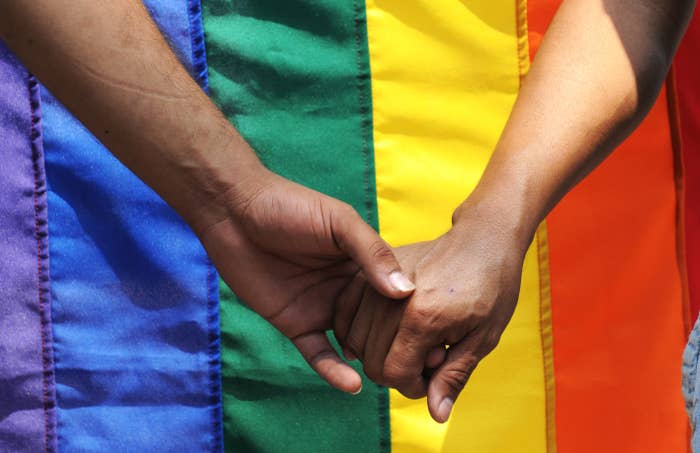
House Republicans will introduce a bill Friday that attempts to do the historically impossible: broker a national compromise between the LGBTQ movement and religious right.
But while sponsors want to create common ground, the only real agreement may be that both sides refuse to budge.
A draft of the 69-page piece of legislation obtained by BuzzFeed News would amend the Civil Rights Act of 1964 with dozens of provisions that, on the one hand, explicitly ban anti-LGBTQ discrimination for the first time nationally in places of public accommodation, workplaces, housing, and banking. It would also protect people on the basis of sex in public places, a protection that was omitted from the five-decade-old antidiscrimination law.
On the other hand, the bill presents a toolbox of new exemptions that religious conservatives may embrace: such as allowing businesses with 15 employees or fewer to discriminate against LGBTQ customers. The bill would also allow certain religious corporations to discriminate against LGBTQ workers, let staff openly raise opinions about marriage among their colleagues, and create a certificate system for private adoption agencies to receive federal tax dollars while turning away LGBTQ parents.
“We realize there will be some people who are dissatisfied,” Republican Rep. Chris Stewart of Utah, the bill’s lead sponsor, told BuzzFeed News, adding that “at least we put something on the table that we agree on.”
It’s unclear, however, how much agreement there will be. The measure has endorsements from the Mormon Church and several moderate evangelical groups; it had about 10 cosponsors in the House as of Thursday, none Democrat, though more cosponsors are expected.
The Church of Jesus Christ of Latter-day Saints, which backed a similar deal in Utah, said the bargain will “preserve religious freedom and protect LGBT individuals from discrimination,” issuing a statement that declares it a “balanced approach that fosters greater fairness for all.”
But it lacks endorsements from the massive national groups on the left and right that tend to spar over LGBTQ and religious protections, such as the Human Rights Campaign and the Heritage Foundation. Both sides have balked at the concept of compromises like these in the past as a nonstarter.
Particularly given that courts are still unresolved over the rights of businesses to refuse custom creative services to LGBTQ people, such as wedding cakes, the exemption for small businesses is sure to draw criticism as allowing discrimination.
Asked about those inevitable complaints, Stewart said, “I don't know anyone who would say, ‘You can’t come into my store to buy a six-pack of Coke if you’re gay.’ The legislation isn’t intended to do that.” It would, however, allow that sort of bias in dozens of US states that lack laws banning anti-LGBTQ discrimination.
As for adoption, the bill would ban federally funded agencies from turning away parents for being LGBTQ. But at the same time, it would create an “indirect funding program” — parents who want to use a private religious agency that does discriminate could obtain a certificate worth thousands of dollars that the private agency could then redeem for federal money.
In education, all K–12 public schools would have to adopt an anti-bullying policy that protects LGBTQ students. Private schools would not be subject to the same policy.
The measure is careful to maintain all existing protections in the Civil Rights Act of 1964, so discrimination based on race and national origin would remain illegal, even by small businesses and religious corporations. Instead, the new exemptions apply strictly on the basis of sex, sexual orientation, and gender identity — thereby establishing, in essence, a lower-class set of nondiscrimination rights.
“People on the religious freedom side say they don’t get what they want as well,” Stewart said of his bill, arguing that the concessions are hardly one-sided.
Hardline conservatives have bristled at adopting at any new LGBTQ rights, which they contend amounts to state-sanctioned endorsement of gender fluidity and nontraditional sexuality. The Heritage Foundation has called compromise ideas an attempt at “forcing all Americans to embrace — and live out — certain beliefs about human sexuality,” while saying a deal means “one side advances and the other is punished.”
The legislation results from a culmination of years of work among conservatives pursuing a detente in the culture war over sexuality and gender, including the Council for Christian Colleges and Universities; they believe crusading against LGBTQ rights has been corrosive to their agenda and exposes them long-term setbacks. They fear, for example, courts may hear another cake shop case and order that stores must sell wedding accessories to gay couples. Decisions like those could be sidestepped by codifying moderate exemptions into federal law now.
“I think we are better to settle this in Congress than in courts,” Stewart said. “Legislation creates permanency that we won’t get with the ebb flow of different court rulings.”
Even if the so-called Fairness for All bill is doomed in the Democrat-controlled House, it may present a menu of opportunities in the Senate. The Equality Act, which passed the House in May, has comprehensive LGBTQ protections without the exemptions, but that’s effectively dead in the Republican-led Senate for now. Provisions of the latest bill are seen by some political strategists as potential amendments that could make the Equality Act more appealing to moderate Senate Republicans and get it moving again.
